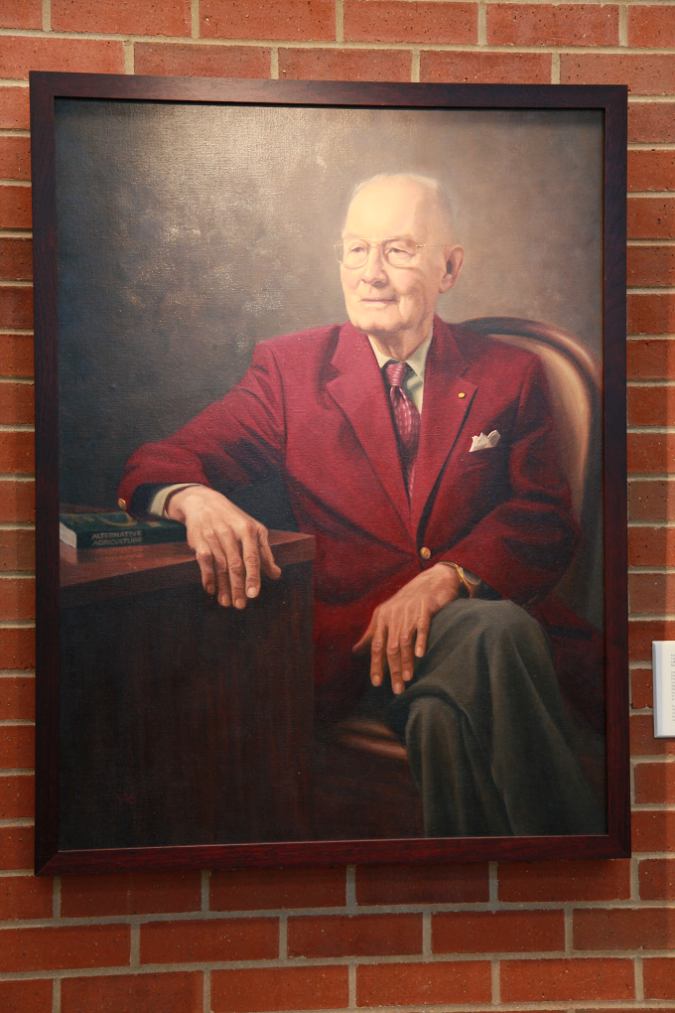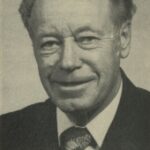
Dr. John Pesek was a soil scientist, champion of sustainable agriculture, teacher and leader. Regrettably, our esteemed colleague passed away February 11. With over 40 years of service to the Department of Agronomy and Iowa State University, Dr. Pesek left a lasting legacy.
Dr. Pesek was born November 15, 1921 in Hallettsville, Texas. He received his bachelor’s degree in agriculture education from Texas A&M in 1943, at which point he entered the military. He was a member of the 98th Bomb Group within the 15th Air Force.
Following his military service, he completed his master’s degree in agronomy with a specialization in soils from Texas A&M in 1947. Dr. Pesek received his doctorate in agronomy from North Carolina State University in 1950.
Dr. Pesek joined the Iowa State agronomy family as assistant professor in 1950. He made his way through tenure ranks becoming associate professor in 1952 and full professor in 1958. In 1964, Dr. Pesek began a 26-year service as department head, taking one year off from 1987-1988 to assume the role of interim dean of the College of Agriculture and Life Sciences.
Under his supervision, the addition to Agronomy Hall was funded and constructed. Dr. Pesek also spearheaded the development of the Agronomy and Agricultural Engineering Research Farms. In addition, Dr. Pesek also helped establish the Soil Tilth Laboratory, a USDA-ARS facility now called the National Laboratory for Agriculture and the Environment.
In 1990 Dr. Pesek transitioned the leadership of the agronomy department to Dr. Ron Cantrell. Known for working all hours of the day, including weekends, Dr. Pesek remained very active in the department until – and after – his retirement in June 1992.
Over the years the students of agronomy and the university served as Dr. Pesek’s guiding principle.
“He would always ask me, ‘but how will it impact the students, Gene,’” said Gene Takle, agronomy professor hired by Dr. Pesek.
During his career he was the major professor for over 40 graduate students and was particularly dedicated to international students and encouraging women to achieve advanced degrees in the sciences. Over 2,000 degrees were awarded to undergraduates and graduate students during Dr. Pesek’s time as department head.
His research, teaching and extension work focused on soil fertility, application of fertilizers and economics of fertilizer use. “His research efforts have led to a better understanding of the effects of management practices, the environment, and their interaction on crop yield response to fertilizer,” wrote Dr. Kenneth Frey. Dr. Pesek authored over 70 scientific papers and 15 book chapters.
Of the many accomplishments of his career, chairing the National Academy of Sciences National Research Council’s committee that developed the 1989 Report on Alternative Agriculture saw tremendous impact across the globe. Dr. Pesek championed the emerging field of sustainable agriculture and those who added their voices to the cause.
The annual Sustainable Agriculture Colloquium was named after Dr. Pesek in 2001.
“Sustainability of an agriculture that is environmentally benign in relation to world resources, population and the environment is a serious issue — perhaps the central issue for the human race . . . We are overdue in adopting new policies — replacing the old with those that are better and safer for farmers, healthier for consumers, kinder to the environment, and ultimately sustainable. After all, we will depend on agriculture for food forever. Even if we do not look forward any farther than we look back to the beginning of agriculture, we are speaking not of decades or centuries but of thousands of years. And our population continues to grow.” – John Pesek, retired Charles F. Curtiss Distinguished Professor in agronomy, speaking at the inaugural John Pesek Colloquium on Sustainable Agriculture March 1-2, 2001
Some of Pesek’s earliest service to the greater Iowa State University community came in the area of human relations and civil rights.
He wrote: “Several years after arriving at Iowa State, I was a member and later, chair, of the Human Relations Committee that helped establish the conscience of the University to follow the spirit and words of the Civil Rights Act, consciously to promote integration and uniform treatment of students, and the employment of faculty and staff.”
Much of the committee’s work was done “without fanfare,” including identifying and changing university documents to remove wording “leading to discriminatory implications.” Pesek wrote that he was the “penman” who wrote the first “Justice for All” statement printed on most university publications. Later, the Human Relations Committee proposed appointing a university Committee on Women. Pesek was an original member of that committee, which was comprised primarily of women.
For his long-time service, Iowa State’s University Human Relations Committee honored Pesek with the first Recognition Award for Significant Contributions to the Betterment of Human Relations at Iowa State University.
Dr. Pesek’s legacy will remain, not only for the Department of Agronomy and Iowa State University, but for the state of Iowa, the nation and the world.
More about Dr. Pesek
- Featured in the first issue of STORIES magazine
- From the Pesek Memoir: Coming to Iowa State, Role in Human Relations
Join us for the 2019 John Pesek Colloquium on Sustainable Agriculture to be held March 28 at 7 pm in the Great Hall of the Iowa State Memorial Union. Dr. David Montgomery from the University of Washington will present “Bringing our soils back to life.”
David R. Montgomery, author of Dirt: The Erosion of Civilizations, is a professor at the University of Washington, where he studies the evolution of topography and how geological processes shape landscapes and influence ecological systems. His most recent book, Growing a Revolution: Bringing Our Soil Back to Life, draws on his farm visits around the world as a MacArthur Fellow. In it he explores practices that help restore soil health and fertility and makes a case for how agriculture can be the solution to global environmental problems.
Written by Tracy Schlater, Department of Agronomy & Brian Meyer, College of Agriculture and Life Sciences





